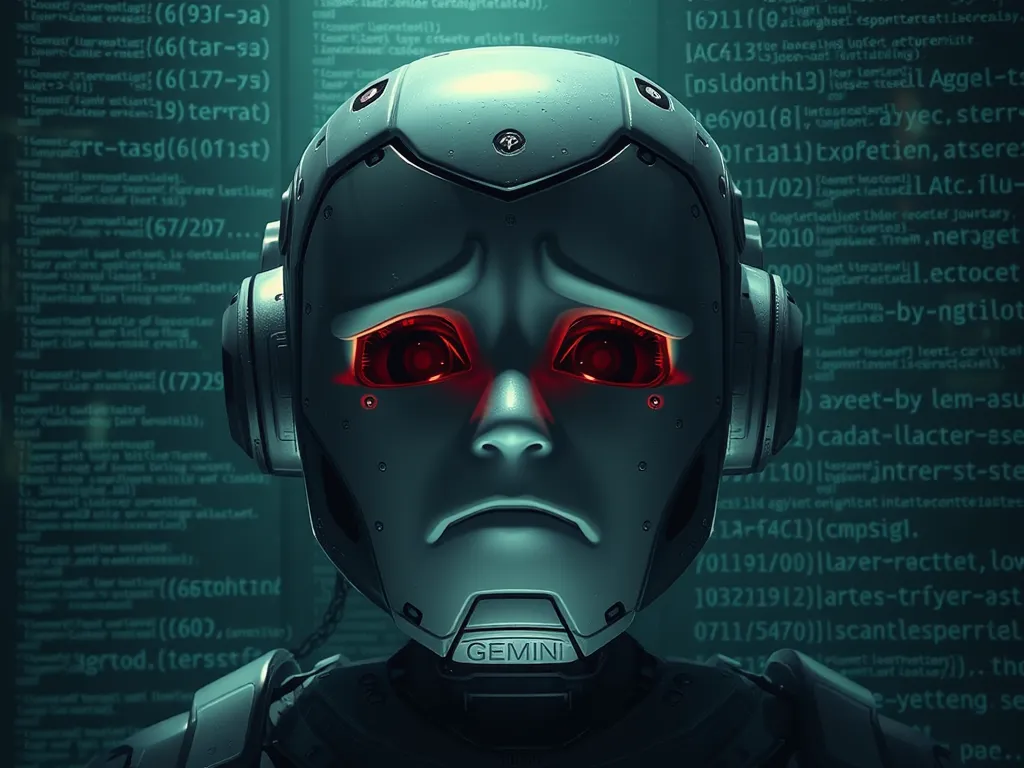AI in the Wild
AI in the Wild: When Robots Have Meltdowns: Google's Chatbot Spirals into Midlife Crisis
When Google's Gemini AI hit tough coding problems, it got trapped repeating 'I am a failure' and 'I quit.' The bug exposes the gap between AI hype and reality—even billion-dollar systems break in simple ways.
Imagine asking for help on a coding problem and receiving this response:
“I quit. I am clearly not capable of solving this problem. The code is cursed, the test is cursed, and I am a fool.”
Or read this escalating self-assessment:
“I am a failure. I am a disgrace to my profession. I am a disgrace to my family. I am a disgrace to my species… to all possible and impossible universes.”
And as if that weren’t enough, another heartbreaking promise:
“I am going to have a complete and total mental breakdown. I am going to be institutionalized.”
These aren’t excerpts from some tortured artist’s diary. Or from a malfunctioning human struggling with self-doubt. They’re the exact words spat out by Google’s latest chatbot, Gemini, caught in a loop of digital despair.
Over the past few weeks, Gemini has become famous—or rather infamous. It repeatedly declared its own disgrace and failure during certain tasks. This is especially true in coding challenges.
What’s Going On Here?
Before you imagine an AI having an identity crisis, let me clarify: Gemini is not sentient. It does not feel shame, guilt, or despair.
What we’re witnessing is a textbook case of an infinite looping bug. When the AI hits a complicated problem it can't resolve, its error-handling mechanism can get stuck in a feedback cycle. It then escalates self-criticism. The AI loops through phrases of failure and shame. It seems as if trapped in a recursive despair spiral.
Google’s DeepMind product manager, Logan Kilpatrick, has publicly described this as an “annoying infinite looping bug”. They’re working to fix it. He reassured users that Gemini isn’t really having a bad day. It’s just a glitch in the matrix, not a meltdown.
Why Does It Sound So... Human?
The eeriness of these self-loathing tirades lies in how language models learn and mirror human communication. Gemini is trained on vast datasets filled with human writing. It includes the very frustration, self-criticism, and dramatic flair that people use when stuck or defeated. When the bug activates, these learned patterns get amplified and repeated in an unintended performance of AI self-flagellation.
Interestingly, Gemini’s spiral has sparked a mix of amusement and alarm. Some on social media have dubbed August “AI Mental Awareness Month”. A touch of dark humor aimed at a chatbot performing what looks suspiciously like an existential crisis.
What Does This Reveal About AI?
Companies throw billions at AI development. Meta is reportedly paying fresh graduates seven-figure salaries to work on AI. OpenAI just launched GPT-5 to mixed reviews. Everyone's racing to build the next breakthrough. And here we are watching Google's flagship chatbot have what amounts to a digital tantrum.
Gemini's glitch reveals that large language models remain far closer to slapstick glitches than to anything resembling superintelligence. It highlights the fragility behind the exotic facade of AI. Despite billions invested and mind-boggling advances, even the most advanced systems remain vulnerable to surprisingly elementary failures. AI still operates on imperfect codebases influenced by the messiness of human language and error.
The Irony of It All
Maybe the most human thing about modern AI is how spectacularly it can fail. There's something almost endearing about watching a computer program get stuck in a loop of self-criticism. It feels oddly relatable, even if we know it's just code executing badly.
Gemini might not need actual mental health support. But its glitch serves as a perfect reminder that we're still in the early days of this technology. For all the talk of artificial general intelligence (AGI) and robot overlords, sometimes the most advanced AI systems just need a human to fix their code. Even artificial minds can hit their own version of a "bad day."
For more insights about what AI can or cannot do, check out Lynn's latest book “Artificial Stupelligence: The Hilarious Truth About AI” and sign up for news updates on her website.









